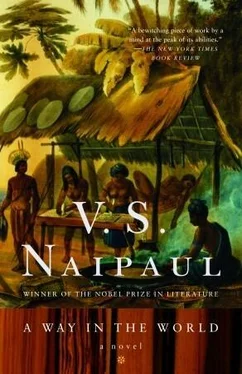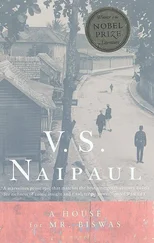“Every day now, in little incidents like this, he began to lose men. Every day there were burials, and not always with their rules. Once for many days he went up the river in a launch. He travelled in this way for two hundred miles. He took me with him. He had said before we started that he knew this stretch of the river well, but it soon was clear that the river here was quite new to him. He was terrified that the people on the banks might shoot poisoned arrows. Every time he saw a rock or coloured earth or sand he wanted to know whether it contained gold. But he never wanted to stay too long on the banks because of his fear of the arrows. When we came back to the settlement we found that one of the ships had gone away.
“It was strange. I had hated Don Diego, the governor. Then I grieved for him. Now I began to grieve for the man who had killed Don Diego. He was frightened and unhappy. He held on to his polished stick but he no longer knew what to do. The soldiers were sick and dying. We had no food. His men had no regard for him. He was frightened that more ships might desert. That was when he decided to send me in the launch to the river mouth to meet the general.
“He sat in the bedroom of the governor’s house and wrote a letter. He said I was not to tell the general about the death of his son. The general should read it first in his letter. Then he began to put things in the launch. A lot of papers from the Treasury, where the general’s dead son had lain for two nights and a day. The oranges and lemons. The only gold things in San Thomé. There were some trees in the settlement. The roll of tobacco. There was tobacco everywhere. That was what people grew to trade with the foreign ships. If only it was food no one would have gone hungry. Then he thought of the tortoise. He would have liked to send the general an armadillo, he said. On the river one day in 1595 he and the general and everybody else had feasted on armadillo. The tortoise wasn’t food, but the general was interested in these strange animals. I was to keep the tortoise cool.
“And then, just before I left, the idea came to him to dress me up in the clothes they had stripped off the dead governor. They were pretty clothes, but they were too big for me. That made him laugh. I thought it was a strange time for a joke like that. But he was probably following some rules of his own. It was like the time he and his officers unchained the Indian in the governor’s house, dressed him up, and called him Señor Don Pedro, and then wanted him and me to sit and eat boiled maize with them in the governor’s house, while the three dead men were unburied outside, and the two dead men were lying in the other room.”
EYES ALONE again, we move down river. But now we are looking at what the launch is leaving behind. We are never far from the northern bank, and we are moving fast, at about four or five miles an hour. At a certain stage we leave the main river and turn into a channel that flows north. We slow down. The current no longer drives us. We depend on wind and tack from side to side, until the banks vanish. We are out in the wide Gulf again, and soon we see the heavy brown pelicans and the slender frigate birds flying over The Soldier.
Half-way through these pictures, as we consider water and flat land, green and brown and yellow, we hear the voice of Fray Simón, the historian.
“You are now a well-travelled man. Better travelled than most people in the world. You’ve been to England. You’ve seen some of its great cities and great buildings. You’ve seen things I haven’t seen. The spire of Salisbury, the great cathedrals of Winchester and Southwark, the Tower of London that they say Julius Caesar built. You’ve met important men. You’ve been to Spain, too. You’ve been to Toledo and Salamanca. You’ve been to Seville. You’ve seen the galleons from the Americas on the river there. And now you’re back here, in New Granada, where you were born. Don José in name and deed.”
“It was the doing of Sir Guateral, the English general. He could have condemned me with a word.”
“Why did he like you?”
“He never said.”
“Did he see in you some resemblance to the son he had lost? Was it because you were among the last people to see his son?”
“We never talked about it. He never asked me about his son.”
“Did you know the general was going to die in a few months?”
“I didn’t know, and I’m glad I didn’t know. It would have been too much for me after all that had happened. And I was full of my own grief.”
“Because of all the dead men? Or grief because you were being taken away?”
“It had been with me for some weeks. But it was only on the launch that I began to understand what I was feeling. I wasn’t a Guiana man. I was from New Granada, and had made that long journey down the river with the Berrios. I always had the hope that I would be able to pick my way back home from Guiana. When the settlement was abandoned, and the vecinos took refuge on the island in the river, I felt the world had changed for me. I felt I had lost touch with things. On the launch this grief grew and grew. Sometimes a child playing in a puddle after rain gets suddenly frightened by the reflected sky. I was like that. I felt I was falling into the sky, falling into the sea. I hardened my heart. And then, from being frightened by that idea of falling into the sky, I began to hold on to it. It was the only comfort I had. The thought of my doom lifted me above people. I thought I would acknowledge no one. Even if people laughed at me, or smiled at me, because of the clothes I was wearing, I wasn’t going to smile back.”
“Was this the face you showed to the general when you went aboard his ship?”
“Yes.”
“You were a lucky man. He had fallen out of love with the Indians. He thought they’d let him down.”
“As I said, he could have condemned me with a word.”
“It may be your demeanour impressed him. Perhaps he saw his fate in yours.”
“He didn’t look at me at first. And I was thinking about the birds above the rock they called The Soldier. Then he began to read the letter, and he cried for his son, and the surgeon held him. It was only after this that I felt his eyes fall on me.”
“Of course, you were the only thing from Guiana he was taking back to England.”
“That was what people said later. At the time I just felt his old man’s eyes falling on my face, and I felt at ease with him.”
“I was hoping to get something else from you, I must confess. My feeling now is that as an historian I should deal as simply as possible with the moment of news. I should present only the facts.”
We consider again the frigate birds floating high over The Soldier, and, lower down, flying in well-spaced lines above the sea glitter, the awkwardly shaped pelicans (like miniature airborne caravels), heavy-bodied, heavy-beaked, with no balancing length of tail.
Over this comes the voice of Fray Simón, reading aloud as he writes his history.
“So their joy at the death in battle of the valiant Don Diego Palomeque de Acuña was well watered by the weeping that began in their ships for the death of their own general’s son.”
WE FOCUS again on Don José: his confident face, his fine Jacobean tunic. He takes up his narrative again.
“When the general was a little restored, he gave orders that I was to be taken to his cabin and given some of his own clothes. So at once my position on the ship changed. People who had looked at me with irony stopped doing so. Even my name they pronounced in a different way. The general’s cabin was small, but the hangings were richer than anything I had seen. The attendant who took me to the cabin opened a chest that was battened down to the floor, took out some clothes, and asked me to choose. The general was closer to my size. It was a relief to get out of the Spanish governor’s clothes. They were the fine clothes he had put on for the battle. The blood had turned black on them, and the red San Thomé mud, from that night of the battle, had dried to powder. They gave off the smell of death and the forest, river water and wet old leaves, and, faintly, as if from a long time before, the smell of the sweet root the governor had kept in his own clothes chest to perfume his clothes and keep out insects. I folded the clothes as neatly as I could and placed them on the lid of the chest.
Читать дальше












